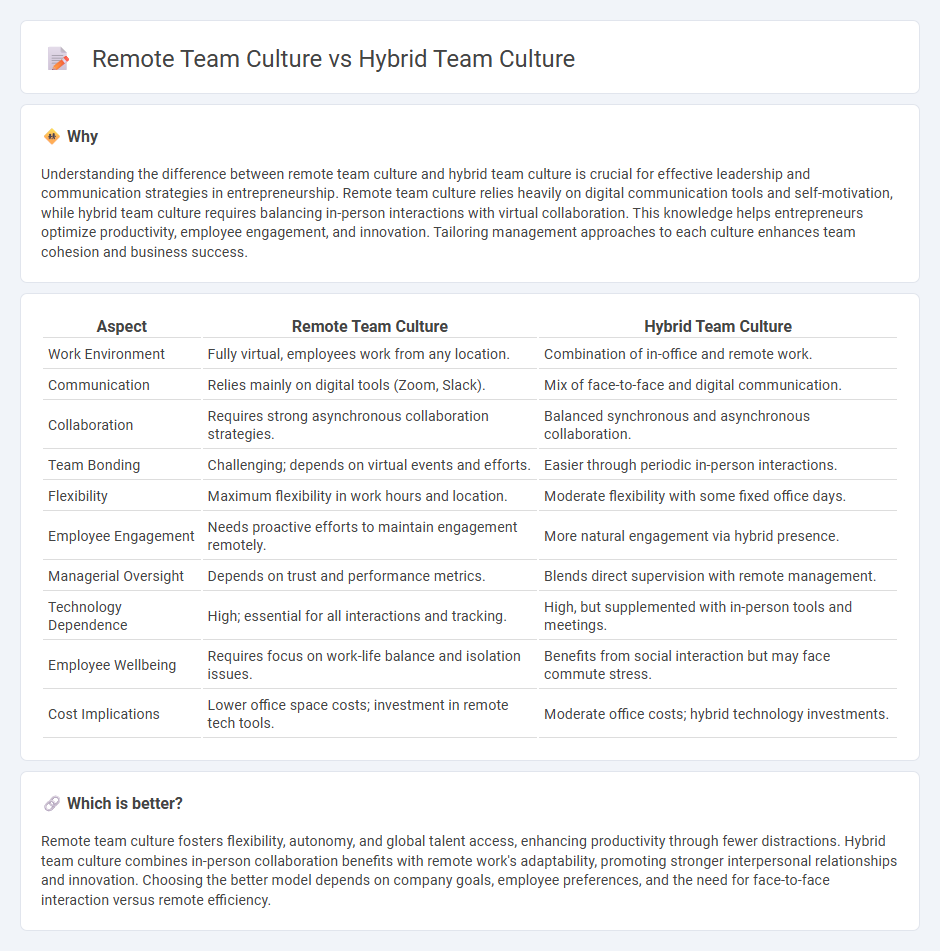
Remote team culture emphasizes flexibility, global talent access, and asynchronous communication, fostering autonomy and digital collaboration tools to maintain productivity across time zones. Hybrid team culture combines in-person interaction with remote work, balancing direct collaboration and social engagement to enhance team cohesion and innovation. Explore the advantages and challenges of both models to optimize your entrepreneurial venture's workforce strategy.
Why it is important
Understanding the difference between remote team culture and hybrid team culture is crucial for effective leadership and communication strategies in entrepreneurship. Remote team culture relies heavily on digital communication tools and self-motivation, while hybrid team culture requires balancing in-person interactions with virtual collaboration. This knowledge helps entrepreneurs optimize productivity, employee engagement, and innovation. Tailoring management approaches to each culture enhances team cohesion and business success.
Comparison Table
| Aspect | Remote Team Culture | Hybrid Team Culture |
|---|---|---|
| Work Environment | Fully virtual, employees work from any location. | Combination of in-office and remote work. |
| Communication | Relies mainly on digital tools (Zoom, Slack). | Mix of face-to-face and digital communication. |
| Collaboration | Requires strong asynchronous collaboration strategies. | Balanced synchronous and asynchronous collaboration. |
| Team Bonding | Challenging; depends on virtual events and efforts. | Easier through periodic in-person interactions. |
| Flexibility | Maximum flexibility in work hours and location. | Moderate flexibility with some fixed office days. |
| Employee Engagement | Needs proactive efforts to maintain engagement remotely. | More natural engagement via hybrid presence. |
| Managerial Oversight | Depends on trust and performance metrics. | Blends direct supervision with remote management. |
| Technology Dependence | High; essential for all interactions and tracking. | High, but supplemented with in-person tools and meetings. |
| Employee Wellbeing | Requires focus on work-life balance and isolation issues. | Benefits from social interaction but may face commute stress. |
| Cost Implications | Lower office space costs; investment in remote tech tools. | Moderate office costs; hybrid technology investments. |
Which is better?
Remote team culture fosters flexibility, autonomy, and global talent access, enhancing productivity through fewer distractions. Hybrid team culture combines in-person collaboration benefits with remote work's adaptability, promoting stronger interpersonal relationships and innovation. Choosing the better model depends on company goals, employee preferences, and the need for face-to-face interaction versus remote efficiency.
Connection
Remote team culture and hybrid team culture are interconnected through their shared emphasis on flexibility, communication, and trust to drive entrepreneurial success. Both cultures rely heavily on digital collaboration tools and clear goal-setting to maintain productivity and engagement across dispersed team members. Integrating remote and in-office dynamics enhances innovation and adaptability, crucial traits in fast-paced entrepreneurial environments.
Key Terms
Collaboration
Hybrid team culture fosters collaboration by combining in-person interactions with flexible remote work, enhancing communication dynamics and team cohesion through occasional face-to-face meetings. Remote team culture relies heavily on digital tools like Slack, Zoom, and project management software to maintain collaboration across different locations and time zones. Discover detailed strategies to optimize collaboration in both hybrid and remote environments.
Communication
Hybrid team culture emphasizes a blend of in-person and virtual communication, fostering collaboration through scheduled face-to-face meetings and digital tools like Slack and Zoom. Remote team culture relies heavily on asynchronous communication methods, such as email and project management platforms like Trello, to accommodate diverse time zones and maintain productivity. Explore more insights on optimizing communication strategies for both hybrid and remote work environments.
Flexibility
Hybrid team culture offers enhanced flexibility by blending in-person collaboration with remote work, allowing employees to choose environments that best suit their tasks and personal preferences. Remote team culture emphasizes flexible work schedules and locations, fostering autonomy and reducing commute-related stress. Discover how these flexibility strategies impact productivity and employee satisfaction to optimize your team dynamics.
Source and External Links
How to Build a Strong Hybrid Work Culture - A strong hybrid work culture thrives on free-flowing communication, collaborative decision-making, accessible information, and leadership that models inclusivity, with trust, autonomy, and recognition as essential foundations.
Building a Strong Company Culture in a Hybrid Work Environment - Successful hybrid cultures require clear and consistent communication, opportunities for collaboration and inclusion, and leaders who exemplify flexibility, respect, and openness to feedback to foster a connected, engaged community.
6 Steps to Create a Thriving Hybrid Culture - Hybrid culture benefits include employee prioritization, increased retention, and wider talent acquisition, supported by active encouragement of cross-functional collaboration and social activities to build community even when working remotely.
 dowidth.com
dowidth.com